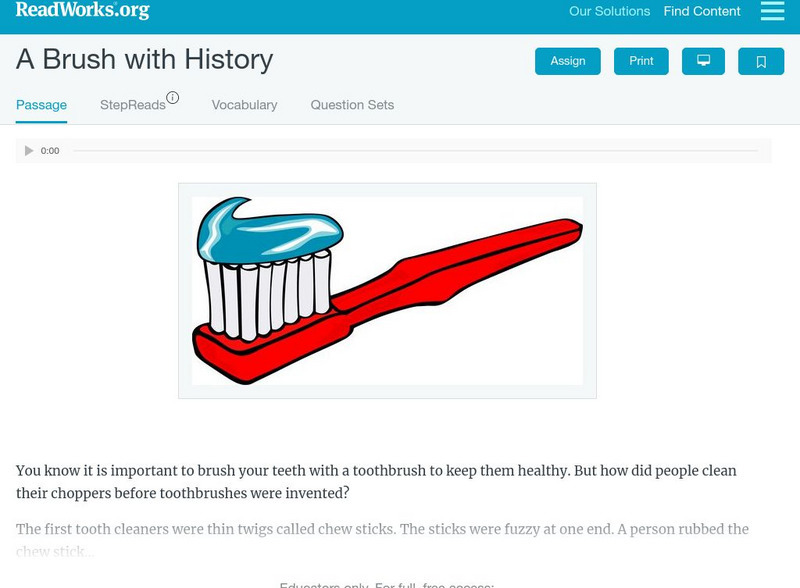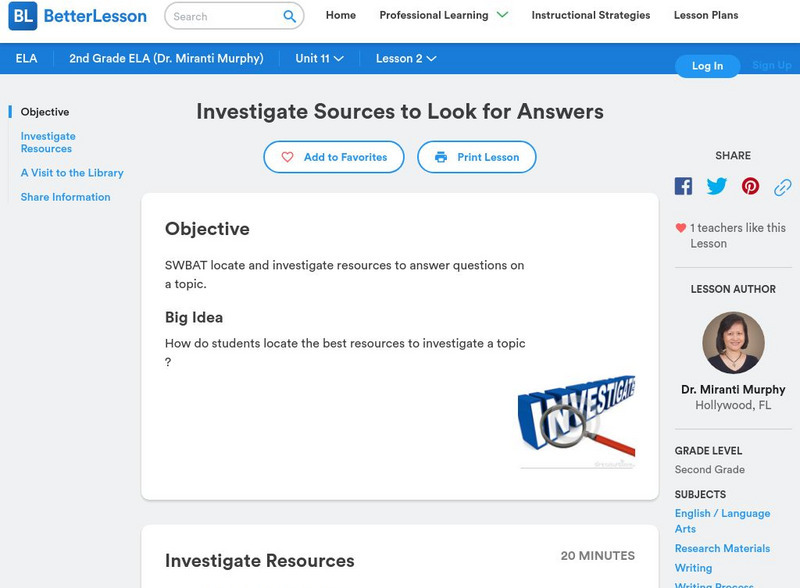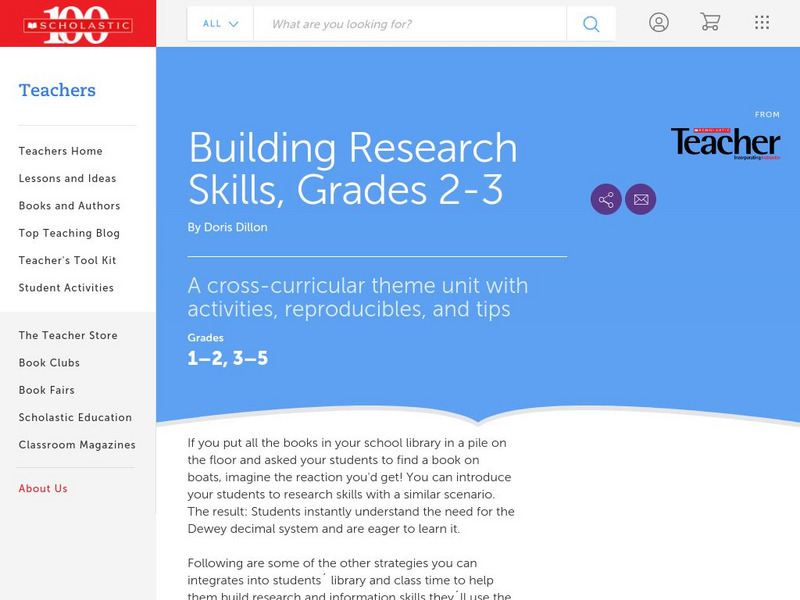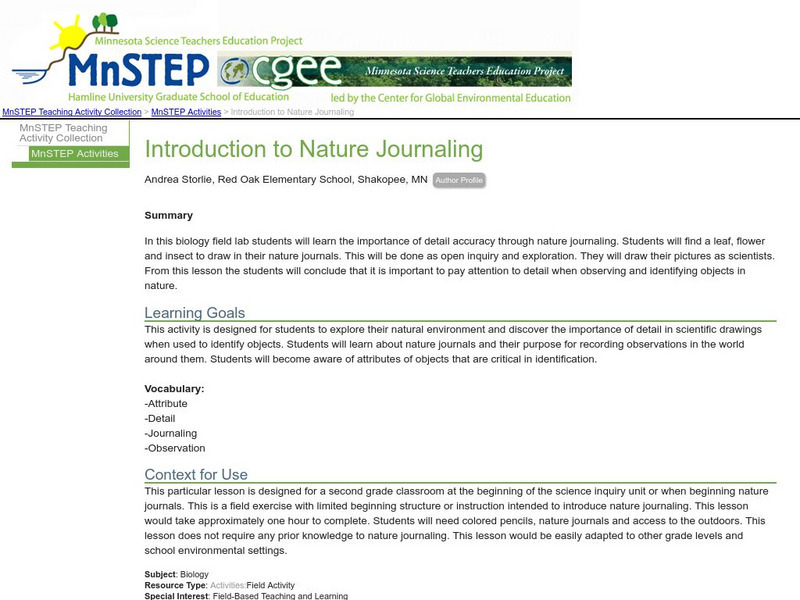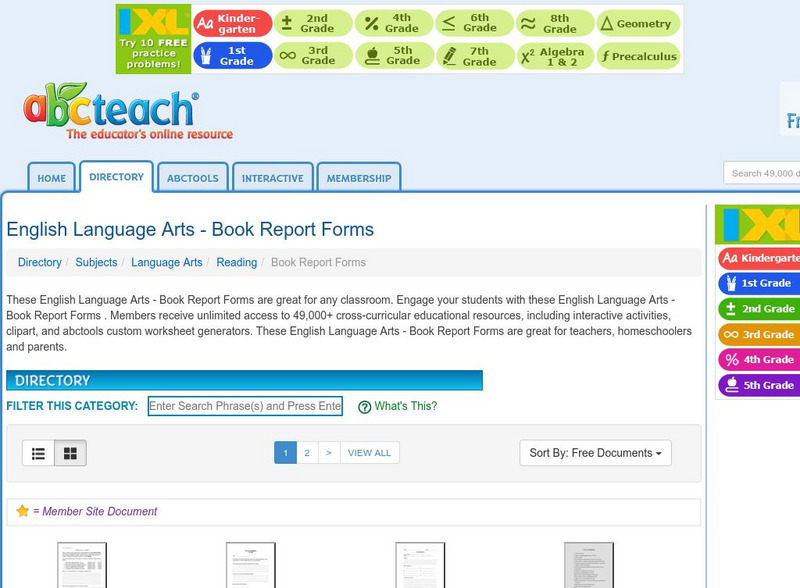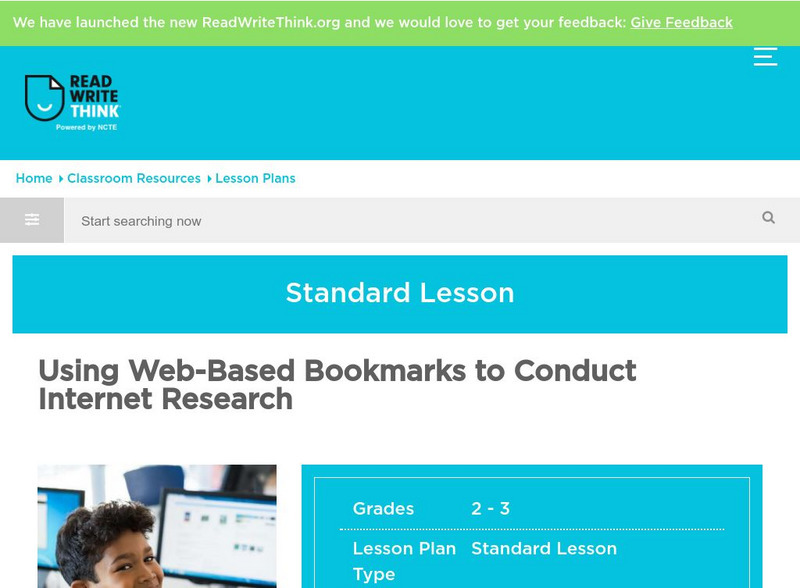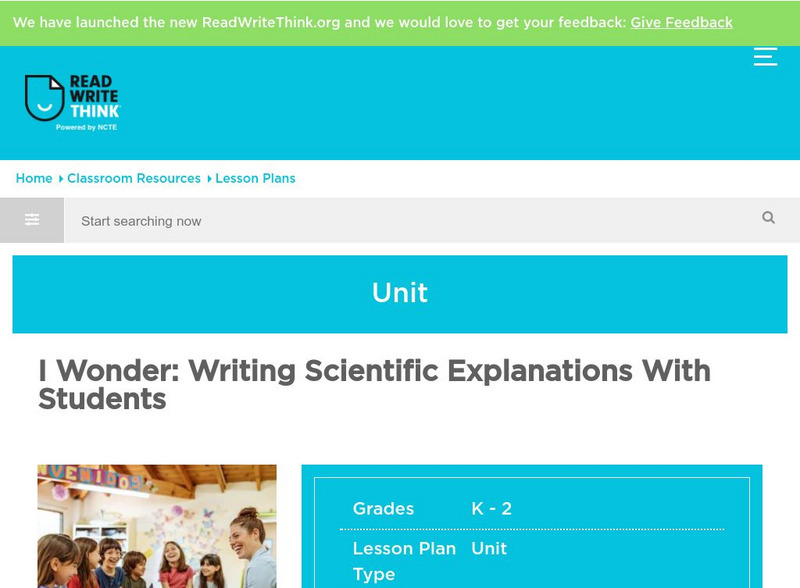Curated OER
Ag In The Outfield
Young scholars explore baseball. This is a cross-curricular plan that includes math, history, and agriculture. Pupils use their five senses to observe the materials a baseball is made from and identify the agricultural products used. In...
Curated OER
Agriculture is a Cycle
What do a bicycle and the life cycle have in common? Cover this and more with the series of cross-curricular activities included in this plan. Learners do everything from making bracelets that represent the life cycle to checking out the...
Smithsonian Institution
Smithsonian in Your Classroom: Introduction to the Nature Journal [Pdf]
Smithsonian in the Classroom presents "Introduction to the Nature Journal." Teachers can download this comprehensive teaching package in which students will practice and develop their skills of writing observations and making hypotheses....
Smithsonian Institution
Smithsonian in Your Classroom: Introduction to the Nature Journal [Pdf]
Smithsonian in the Classroom presents "Introduction to the Nature Journal." Teachers can download this comprehensive teaching package in which students will practice and develop their skills of writing observations and making hypotheses....
Writing Fix
Writing Fix: Writing Across the Curriculum
Designed by groups of Nevada teachers, this collection of modules and lesson plans is continually growing. Find suggestions for incorporating good writing practices in non-language arts areas of the curriculum from history to science.
abcteach
Abcteach: Biography Research Form [Pdf]
Good printable worksheet that helps learners complete biographical research.
Read Works
Read Works: Passages: Grade 2: A Brush With History
[Free Registration/Login Required] Students read a non-fiction article about the history of a toothbrush and answer questions in comprehension, sequencing, inferences, main idea, transitions, and more. A link to paired text questions is...
Beacon Learning Center
Beacon Learning Center: Bibliography Blunders
This tutorial focuses on how to complete a bibliography using MLA style. It gives specific directions and examples for various types of entries such as magazines, books, encyclopedias, and web pages. It also gives specifics for the...
CPALMS
Cpalms: Browse and Search Resources
This site shares a collection of expert and peer-vetted teacher resources that are searchable for teachers and students. Searching can be achieved via a subject, grade, audience, and/or type. Curricula standards for the following subjets...
Reading Rockets
Reading Rockets: Reading Topics a to Z: Scientific Language in Primary Grades
Research on the importance of teaching scientific language usage, ideas for utilizing scientific language, and rubrics for assessing student use of scientific language in grade schools.
Unite for Literacy
Unite for Literacy: Community: I Am a Scientist
This book shows some of the many different types of scientists. Includes audio narration in 6 additional languages with text in English.
Utah Education Network
Uen: Grade 2 on Demand Writing Samples
This resource is provided by the Vermont Writing Collaborative. Many examples of student's on-demand opinon writings are included. Students had been prompted to decide which kind of pet is best, a cat or a dog.
National Science Teachers Association
Nsta: Science & Engineering Practices: Obtaining, Evaluating, Communication
This site from NSTA includes a progression of the Science and Engineering Practice for obtaining, evaluating, and communicating information. In addition, thereare performance expectations that make use science and engineering practices.
Better Lesson
Better Lesson: I Learned It Online
Preparing the new generations for college and career readiness absolutely requires us to ensure our children are competent and comfortable in the use of a variety of digital tools. Young scholars will be learning about a topic online and...
Better Lesson
Better Lesson: Investigate Sources to Look for Answers
Students will practice locating and investigating resources to answer questions on a topic using the FINDS research process. FINDS is an acronym describing its five-step research process: Focus, Investigate, Note, Develop, and Score. A...
CPALMS
Cpalms: Home Is Where the Heart Is: Researching Habitats
[Free Registration/Login Required] In this lesson plan, students will learn about different types of habitats as they gather information based on provided research questions. Students will summarize the information from their research in...
Scholastic
Scholastic Instructor: Building Research Skills 2 3
Check out this site to learn more about building research skills for grades 2-3. This site offers suggestions for activities that will sharpen your abilities.
Science Education Resource Center at Carleton College
Serc: Introduction to Nature Journaling
In this activity, students will be introduced to nature journaling and discover the importance of detail accuracy in scientific drawings when used to observe and identify objects.
abcteach
Abcteach: Book Report Forms
[Free Registration/Login Required] Teachers will find several blackline masters for primary, elementary and middle school students for use when doing various types of book reports such as fiction, biography, fairy tales, historical...
PBS
Pbs Kids: Martha: True Stories
A collection of interactive story activities about topics including the environment, technology, inventions, and measuring. There are four stories about each of the topics. In addition to being able to page through the books, the books...
Polk Brothers Foundation Center for Urban Education at DePaul University
De Paul University: Center for Urban Education: I Can Locate and Classify Information [Pdf]
A blank T-Chart is provided for students to use as they sort facts into two categories. Students will classify science information with this aid.
ReadWriteThink
Read Write Think: Using Web Based Bookmarks to Conduct Internet Research
The important thing about this lesson is that it connects literature and science. The Important Book by Margaret Wise Brown provides a model for original student poems about a content area topic. Web-based bookmarks guide young scholars...
ReadWriteThink
Read Write Think: I Wonder: Writing Scientific Explanations With Students
Students choose a question to explore, research it using a variety of resources, organize their information on a TCF chart, and then collaboratively write a class scientific explanation.
ReadWriteThink
Read Write Think: Literature Circles With Primary Students, Self Selected Reading
Learners respond to self-selected books in journals and talk about their books daily in small groups. The teacher guides students by offering suggestions and writing with them in dialogue journals.




![Smithsonian in Your Classroom: Introduction to the Nature Journal [Pdf] Unit Plan Smithsonian in Your Classroom: Introduction to the Nature Journal [Pdf] Unit Plan](https://d15y2dacu3jp90.cloudfront.net/images/attachment_defaults/resource/large/FPO-knovation.png)

